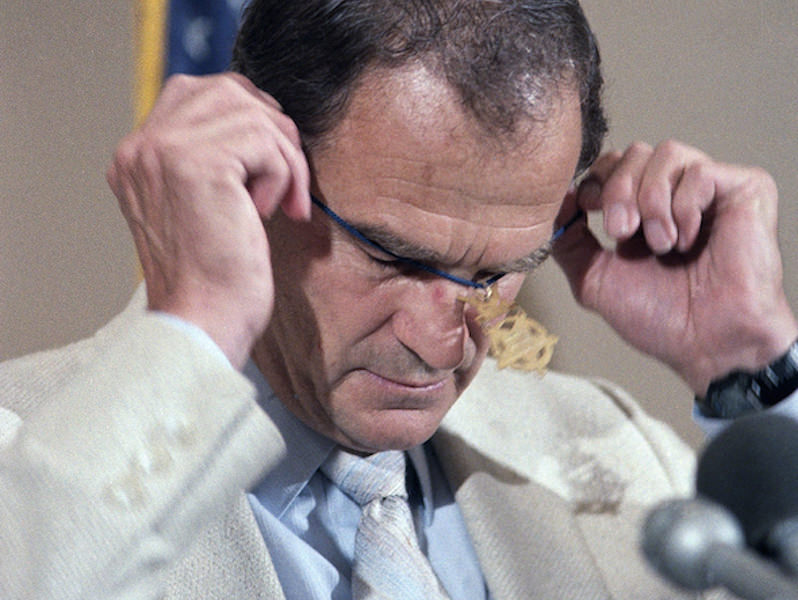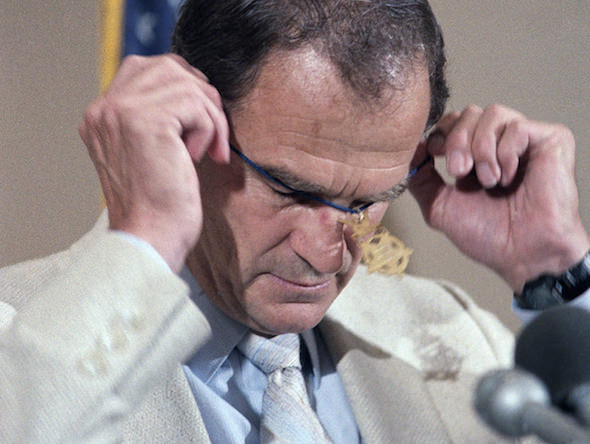Truthdigger of the Week: Charlie Liteky, Decorated U.S. Army Chaplain Turned Peace Activist
The former Roman Catholic priest, who died Jan. 20, was the only American to renounce the Medal of Honor.

Charles Liteky, removing his Medal of Honor during a Capitol Hill news conference in 1986. (Barry Thumma / AP)
Of the 3,515 Americans who have received the Medal of Honor, the highest accolade in the U.S. military, only one has renounced the esteemed award.
That man was Charles “Charlie” Liteky, a U.S. Army chaplain turned peace activist, who died Jan. 20 at 85. Although he is best known for rejecting the Medal of Honor in 1986, Liteky’s post-military life was abundant in activism and civil disobedience. His legacy serves as a crucial reminder of the need for both committed activists and peaceful ideologies in an increasingly neoliberal and neofascist world.
Liteky, a Roman Catholic priest, served two tours as an Army chaplain in the Vietnam War. “On Dec. 6, 1967, Mr. Liteky, the son of a career Navy petty officer, repeatedly neglected his own shrapnel wounds and, without a weapon, helmet or flak jacket, exposed himself to mortars, land mines and machine guns to rescue 23 wounded colleagues who had been ambushed by a Vietcong battalion,” The New York Times wrote. “He evacuated the injured soldiers and administered last rites to the dying.”
President Lyndon B. Johnson awarded Liteky the Medal of Honor in 1968. Watch video of the ceremony below—Liteky’s medal presentation begins at the 5:50 mark:
Liteky (referred to as Angelo, his ordination name, in the video above) was rewarded “for conspicuous gallantry and intrepidity in action at the risk of his life, above and beyond the call of duty.”
“I was 100 percent behind going over there and putting those Communists in their place,” Liteky once recalled of his desire to go to Vietnam. “I thought I was going there doing God’s work.”
But in the years after his two tours in Vietnam, Liteky changed. He left the priesthood in 1975. His activism seemed to flourish several years later when he met his future wife, Judy Balch. A former nun, Balch introduced Liteky to Latin American refugees, catalyzing his engagement in anti-war movements.
By the late 1980s, Liteky had transformed himself into a full-fledged peace activist. On July 29, 1986, “he left his Medal of Honor and a letter to President Ronald Reagan at the Vietnam Veterans Memorial on the Mall,” according to The Washington Post.
In an interview with Amy Goodman of Democracy Now! in 2004, Liteky recalled how he concluded this letter:
I finally ended the letter to President Reagan with this short paragraph. I said, “I pray for your conversion, Mr. President. Some morning I hope that you wake up and hear the cry of the poor riding on a southwest wind from Guatemala, Nicaragua and El Salvador. They’re crying, stop killing us.”
After renouncing his accolade, Liteky became more entrenched in peace efforts. He told the San Francisco Examiner in 2000:
I’d begun to wake up about what my country was doing to Latin America. I’d studied the history and talked to refugees here in San Francisco. Then I had to go down and see for myself, to El Salvador, Nicaragua and Honduras. I was ashamed of my country. And I was ashamed I’d participated in the same thing in Vietnam.
“It was a beginning of a process of metamorphosis for me to discover what our government has been involved in over the years,” Liteky said in his conversation with Goodman. “So, as a result of my visit to El Salvador and Nicaragua, I decided that I no longer wanted a medal associated with a government that would be behind such things by way of policy.”
In the same year he relinquished his Medal of Honor, he “mounted a debilitating 47-day hunger strike near the Capitol against American involvement in Nicaragua,” The New York Times wrote. “He later served two terms for trespassing at the Army’s School of the Americas (now the Western Hemisphere Institute for Security Cooperation) at Fort Benning, Ga., which trains soldiers from Latin America.”
Liteky spent multiple stints behind bars as a result of his impassioned activism. “He was sentenced to six months in federal prison in 1990 for squirting blood on portraits at the school,” the Times continued, “and to the maximum one year in 2000 for a similar protest.”
Liteky’s pro-peace efforts continued into the 2000s, and he regularly spoke about his military and activist experiences to highlight the problems of U.S. interference abroad.
“This mess in Iraq is, to me, far worse than Vietnam for a lot of reasons,” Liteky told Goodman. “I am in deep sympathy with all of those young men that are over there now doing what they think is their patriotic duty.”
“I think it is more of a patriotic duty of citizens of this country to stand up and say that this is wrong, that this is immoral.”
Judith Liteky died in August 2016 at 74. Charlie Liteky passed away in San Francisco Jan. 20, several weeks after suffering a stroke.
In the wake of President Trump’s first week in the White House, Liteky’s life serves as a crucial example of the need for outspoken activism in the face of an unjust government. His transformation from decorated Army chaplain to fierce peace proponent should encourage Americans, regardless of their background, to stand up for what is right—even if it means making sacrifices along the way.
For his unwavering commitment to peace and justice, Charles Liteky is our Truthdigger of the Week.
Independent journalism is under threat and overshadowed by heavily funded mainstream media.
You can help level the playing field. Become a member.
Your tax-deductible contribution keeps us digging beneath the headlines to give you thought-provoking, investigative reporting and analysis that unearths what's really happening- without compromise.
Give today to support our courageous, independent journalists.








You need to be a supporter to comment.
There are currently no responses to this article.
Be the first to respond.